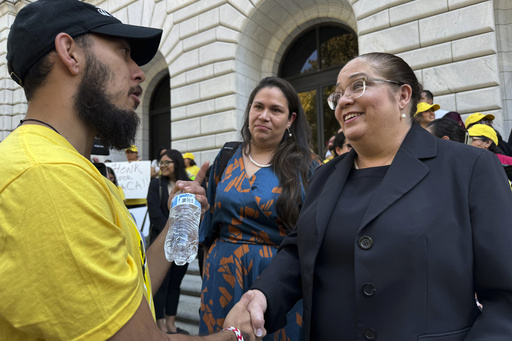NEW ORLEANS — Over 200 demonstrators, primarily individuals who arrived in the United States illegally as children, gathered outside a federal courthouse in New Orleans on Thursday. Their aim was to support the Biden administration’s policy that protects them from deportation. This demonstration coincided with an important session at the 5th U.S. Circuit Court of Appeals, where three appellate judges deliberated on this ongoing legal battle.
The outcome of this case is crucial for approximately 535,000 individuals who have established lives in the U.S. without legal status. The legal discourse could ultimately reach the Supreme Court, determining the fate of these individuals who face the risk of deportation despite their deep roots in American society.
María Rocha-Carrillo, a 37-year-old participant who traveled from New York to be at the demonstration, poignantly expressed her situation: “I live here. I work here. I own a home here.” Having arrived in the U.S. at the age of three from Mexico, she highlighted the significance of the Deferred Action for Childhood Arrivals (DACA) program, which enabled her to pursue a career in education.
Opposition to DACA is spearheaded by Texas and eight other Republican-led states. These states argue in court that substantial costs related to health care, education, and other social services burden them as a result of permitting immigrants to stay in the country illegally.
A significant aspect of the arguments presented was whether Texas possesses the legal standing to pursue this lawsuit. There is contention over whether a judicial decision made by a lower court judge in Texas has the jurisdiction to issue a nationwide order. Proponents of DACA contend that the state has not sufficiently demonstrated the fiscal impact it attributes to the policy, thus questioning its standing.
Judge Stephen Higginson engaged in questioning Texas Attorney General’s Office representative Joseph Mazzara, pointing out that 22 states have stated they benefit from the presence and contributions of DACA recipients, often referred to as “Dreamers.” “How could a single judge tell all 22 other states who are so grateful for these people that they must leave the United States?” Higginson queried, underlining the complexity of the matter.
On the other hand, Judge Jerry Smith expressed skepticism regarding the notion that Texas lacks legal standing to challenge DACA. In earlier rulings, the 5th Circuit determined that Texas did indeed have standing to pursue such a case. However, Boynton indicated that the Supreme Court has since raised the standard for states to argue standing, which Smith countered, stating that precedent does not outright mandate the appeals court to retract its previous decision.
The timeline for the panel’s decision, composed of judges appointed by Presidents Reagan, Bush, and Obama, remains uncertain. Regardless of the outcome, it is anticipated that the case will escalate to the Supreme Court in the future.
DACA was established by President Obama in 2012, addressing Congress’s failure to enact legislation that could provide legal pathways to citizenship for young individuals brought to the country. After years of ongoing legal struggles, President Biden has made efforts to reinstate the program in hopes of securing its future approval in courts.
In 2022, U.S. District Judge Andrew Hanen ruled that the executive branch had overstepped its authority, consequently prohibiting the acceptance of new DACA applications while allowing those already approved to maintain their status pending appeals. During the current proceedings, Boynton urged the judges to uphold this policy during the ongoing appeals process.
Outside the courthouse, Wendy Reynoso, a 24-year-old who was brought to the U.S. from Guatemala as a child, shared her frustration regarding her DACA application, which remains unresolved amid the litigation. With a mechanical engineering degree, she lamented, “It hurts because even though I graduated with such a good degree, I’m not able to use it. So, I’m just stuck.”
Defenders of DACA argue that Congress has empowered the Department of Homeland Security to set immigration policy, facilitating the program’s continuation. The coalition of states challenging DACA includes Alabama, Arkansas, Louisiana, Nebraska, South Carolina, West Virginia, Kansas, and Mississippi. Their legal opposition is supported by the Immigration Reform Law Institute, which stated, “Congress has repeatedly refused to legalize DACA recipients, and no administration can take that step in its place,” according to the executive director, Dale L. Wilcox.


